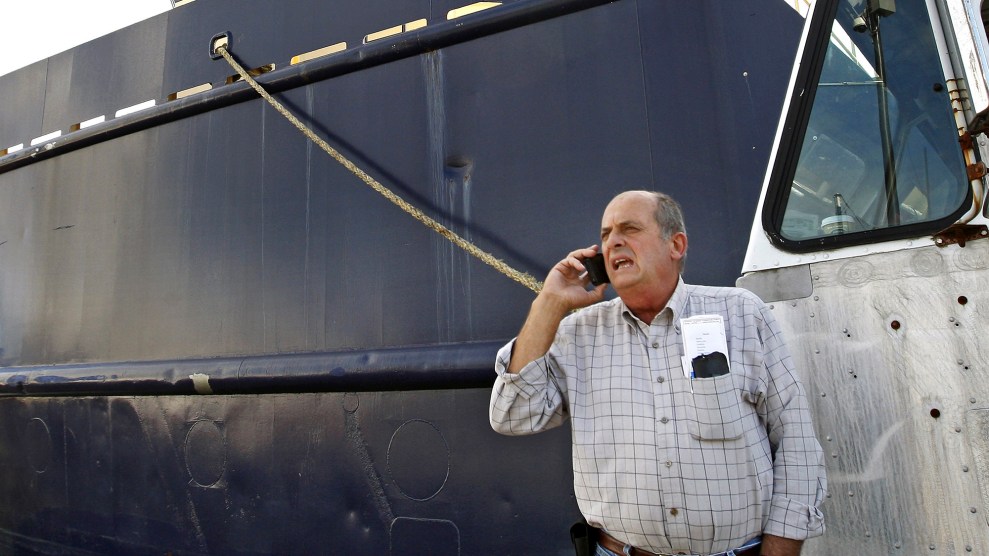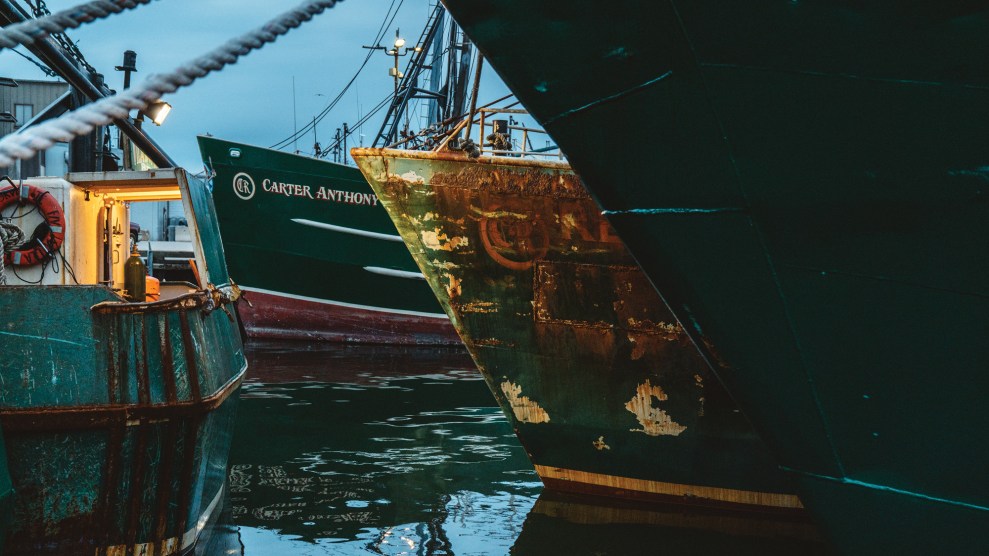
Carlos Rafael in New Bedford, Mass., in 2014John Sladewski/AP
This story was originally published by Food and Environment Reporting Network.
Criminals don’t come more colorful than Carlos Rafael, once the most powerful fisherman in the nation’s most valuable seafood port. Rafael, who was the subject of a FERN story published earlier this year with Mother Jones, was known widely as the Codfather. He conquered the fishing industry in New Bedford, Mass., through a combination of guile and rule-bending; he famously described himself as a pirate, and told regulators it was their job to catch him. On Monday, the law finally caught up to the Codfather: A federal judge sentenced Rafael to 46 months in prison for masterminding one of the biggest fisheries frauds in American history.

The scheme for which Rafael was sentenced exploited a gaping loop in federal fisheries regulations. Rafael’s company, Carlos Seafood, Inc., owns approximately 40 boats, as well as a fish-processing facility. Although National Oceanic and Atmospheric Administration (NOAA) regulations require vessels and processing plants to independently submit catch reports, Rafael’s vertical integration allowed him to falsify both sets of documents and skirt quotas on valuable species like sole. He then sold his illegal wares to a buyer in New York for bags of cash—or “jingles,” as Rafael called them—which he smuggled to Portugal with the help of Antonio Freitas, a corrupt Bristol County Sheriff’s deputy.
Freitas was convicted of charges including bulk cash smuggling in July, and is scheduled to be sentenced Oct. 12. In August, James Melo, a captain in Freitas’ office, was arrested for allegedly abetting Rafael’s fraud.
Environmental groups and industry representatives alike hailed Rafael’s sentence, which nearly equaled the 51 months federal prosecutors had sought. In a statement to the Cape Cod Times, Tom Nies, executive director of the New England Fishery Management Council, called Rafael “a criminal who stole from his fellow fishermen,” and said the penalty was “well deserved.”
The investigation that took down the Codfather was as extraordinary as his crime. In June 2015, undercover IRS agents posing as Russian mobsters met with Rafael at his headquarters on New Bedford’s South Front Street, and expressed interest in buying his company. According to an affidavit filed by agent Ronald Mullett, Rafael told them that thanks to his under-the-table transactions, Carlos Seafood was worth $175 million, more than eight times what he had claimed to the IRS. “You could be the IRS in here,” Rafael said. “This could be a clusterfuck. So I’m trusting you.”
In March 2017, Rafael pleaded guilty to 28 offenses, including conspiracy, false labeling, bulk cash smuggling, and tax evasion. Sentencing was repeatedly postponed throughout the spring and summer, during which time NOAA allowed Rafael’s fleet to continue to fish, angering his competitors. “It infuriates those of us that have been crippled by onerous regulations yet have managed to comply,” Boston-based fishermen Chris and Amanda Odlin wrote to NOAA at the time.
At Rafael’s sentencing, his lawyer, William Kettlewell, read a statement written by the Codfather that described the fraud as “the stupidest thing I ever did.” Judge William Young, however, was not swayed.
“This was not stupid,” Young told Rafael. “This was corrupt. This was a corrupt course of action from start to finish.”
In addition to nearly four years in prison, Rafael will serve three years of supervised release and pay a $200,000 fine. His defense had sought 24 months of probation and no prison time. Rafael is scheduled to report to prison on Nov. 6.
Although Young handed down Rafael’s prison sentence on Monday, the judge declined to rule on an equally important question: the fate of the 13 groundfish vessels and fishing permits that the Codfather used to perpetrate his scheme. The value of those assets has been appraised at as high as $30 million. In court, Young said he had “grave doubts” about the constitutionality of seizing such valuable property but that he planned to rule as soon as possible.
The decision on how Rafael’s vessels and permits should be disbursed will ultimately fall to NOAA. New Bedford mayor Jon Mitchell has lobbied to keep the permits in Rafael’s home port to maintain the waterfront jobs that Carlos Seafood supported. At sentencing, Rafael announced that he had reached an agreement to sell his property to close business associates, brothers Richard and Ray Canastra. The possibility that NOAA will allow the sale alarms Brett Tolley, a community organizer with the Northwest Atlantic Marine Alliance, who fears that keeping Rafael’s empire intact “would be like replacing the Codfather with the Cod-sons.”
Others have suggested that the government invest in technology to prevent future fraud. Johanna Thomas, New England regional director for the Environmental Defense Fund’s Oceans Program, called the situation “a once-in-a-lifetime opportunity for NOAA to use millions of dollars of Rafael’s assets to fund electronic monitoring for the New England groundfish fleet — a move that would save fishermen money while protecting fish and fishermen from similar crimes in the future.”
In recent years, overfishing and regulations have particularly disadvantaged New England’s small-boat owners, a fleet that Rafael once called “mosquitoes on the balls of an elephant.” Between 2010 and 2013, about 120 vessels left the groundfish industry, attrition that disproportionately harmed the owners of smaller vessels. Tolley believes that Rafael’s assets represent a chance to reverse course.
“Will we exacerbate consolidation and the ‘too big to fail’ model? Or will NOAA reallocate the permits in a way that will level the playing field for community-based fishermen?” Tolley said. “That question will determine the future of the groundfish industry and beyond.”













